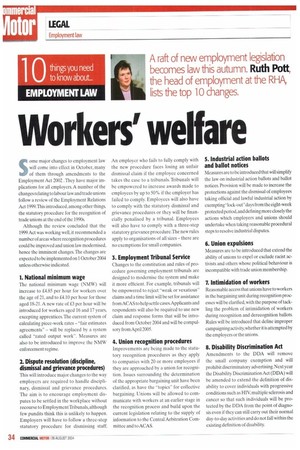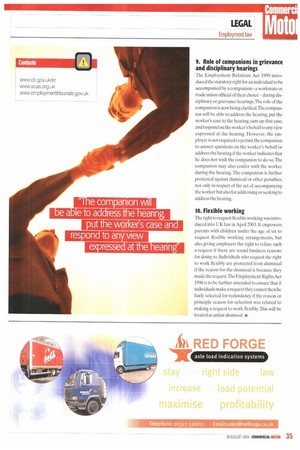Workers' welfare
Page 34

Page 35

If you've noticed an error in this article please click here to report it so we can fix it.
Some major changes to employment law will come into effect in October, many of them through amendments to the Employment Act 2002 .They have major implications for all employers. A number of the changes relating to labour law and trade unions follow a review of the Employment Relations Act 1999.This introduced, among other things, the statutory procedure for the recognition of trade unions at the end of the 1990s.
Although the review concluded that the 1999 Act was working well, it recommended a number of areas where recognition procedures could be improved and union law modernised, hence the imminent changes. The changes are expected to be implemented on 1 October 2004 unless otherwise indicated.
1. National minimum wage
The national minimum wage (NMW) will increase to £4.85 per hour for workers over the age of 21, and to £4.10 per hour for those aged 18-21. A new rate of £3 per hour will be introduced for workers aged 16 and 17 years, excepting apprentices. The current system of calculating piece-work rates — "fair estimates agreements" — will be replaced by a system called "rated output work". Measures are also to be introduced to improve the NMW enforcement regime.
2. Dispute resolution (discipline, dismissal and grievance procedures)
This will introduce major changes to the way employers are required to handle disciplinary, dismissal and grievance procedures. The aim is to encourage employment disputes to be settled in the workplace without recourse to Employment Tribunals, although few pundits think this is unlikely to happen. Employers will have to follow a three-step statutory procedure for dismissing staff. An employer who fails to fully comply with the new procedure faces losing an unfair dismissal claim if the employee concerned takes the case to a tribunals. Tribunals will be empowered to increase awards made to employees by up to 50% if the employer has failed to comply. Employees will also have to comply with the statutory dismissal and grievance procedures or they will be financially penalised by a tribunal. Employees will also have to comply with a three-step statutory grievance procedure.The new rules apply to organisations of all sizes — there are no exemptions for small companies.
3. Employment Tribunal Service
Changes to the constitution and rules of procedure governing employment tribunals are designed to modernise the system and make it more efficient. For example, tribunals will be empowered to reject "weak or vexatious" claims and a time limit will be set for assistance from ACAS to help settle cases.Applicants and respondents will also be required to use new claim and response forms that will be introduced from October 2004 and will be compulsory from Apri12005.
4. Union recognition procedures
Improvements are being made to the statutory recognition procedures as they apply to companies with 20 or more employees if they are approached by a union for recognition. Issues surrounding the determination of the appropriate bargaining unit have been clarified, as have the "topics" for collective bargaining. Unions will be allowed to communicate with workers at an earlier stage in the recognition process and build upon the current legislation relating to the supply of information to the Central Arbitration Committee and to ACAS.
5. Industrial action ballots and ballot notices
Measures are Lobe introduced that will simplify the law on industrial action ballots and ballot notices. Provision will be made to increase the protections against the dismissal of employees taking official and lawful industrial action by exempting "lock-out "days from the eight-week protected period,and defining more closely the actions which employers and unions should undertake when taking reasonable procedural steps to resolve industrial disputes.
6. Union expulsions
Measures are to be introduced that extend the ability of unions to expel or exclude racist activists and others whose political behaviour is incompatible with trade union membership.
7. Intimidation of workers
Reasonable access that unions have to workers in the bargaining unit during recognition processes will be clarified, with the purpose of tackling the problem of intimidation of workers during recognition and derecognition ballots. Rules will be introduced that define improper campaigning activity, whether it is attempted by the employers or the unions.
8. Disability Discrimination Act
Amendments to the DDA will remove the small company exemption and will prohibit discriminatory advertising. Next year the Disability Discrimination Act (DDA) will be amended to extend the definition of disability to cover individuals with progressive conditions such as HIV, multiple sclerosis and cancer so that such individuals will be protected by the DDA from the point of diagnosis even if they can still carry out their normal day-to-day activities and do not fall within the existing definition of disability.
9. Role of companions in grievance and disciplinary hearings The Lmployment Relations Act 1999 introduced the statutory right for an individual to be accompanied by a companion— a workmate or trade union official of their choice — during disciplinary or grievance hearings. The role of the companion is now being clarified.The companion will be able to address the hearing, put the worker's case to the hearing, sum up that case, and respond on the worker's behalf to any view expressed at the hearing. However, the employer is not required to permit the companion to answer questions on the worker's behalf or address the heating if the worker indicates that he does not wish the companion to do so. The companion may also confer with the worker during the hearing. The companion is further protected against dismissal or other penalties, not only in respect of the act of accompanying the worker hut also for addressing or seeking to address the hearing.
10. Flexible working The right to request flexible working was introduced into 1;1( law in April 2003. It empowers parents with children under the age of six to request flexible working arrangements, but also giving employers the right to refuse such a request if there are sound business reasons for doing so. Individuals who request the right to work flexibly are protected from dismissal if the reason for the dismissal is because they made the request.The Employment Rights Act 1996 is to be further amended to ensure that if individuals make a request they cannot then be fairly selected for redundancy if the reason or principle reason for selection was related to making a request to work flexibly. This will be treated as unfair dismissal. •


























































































































































































